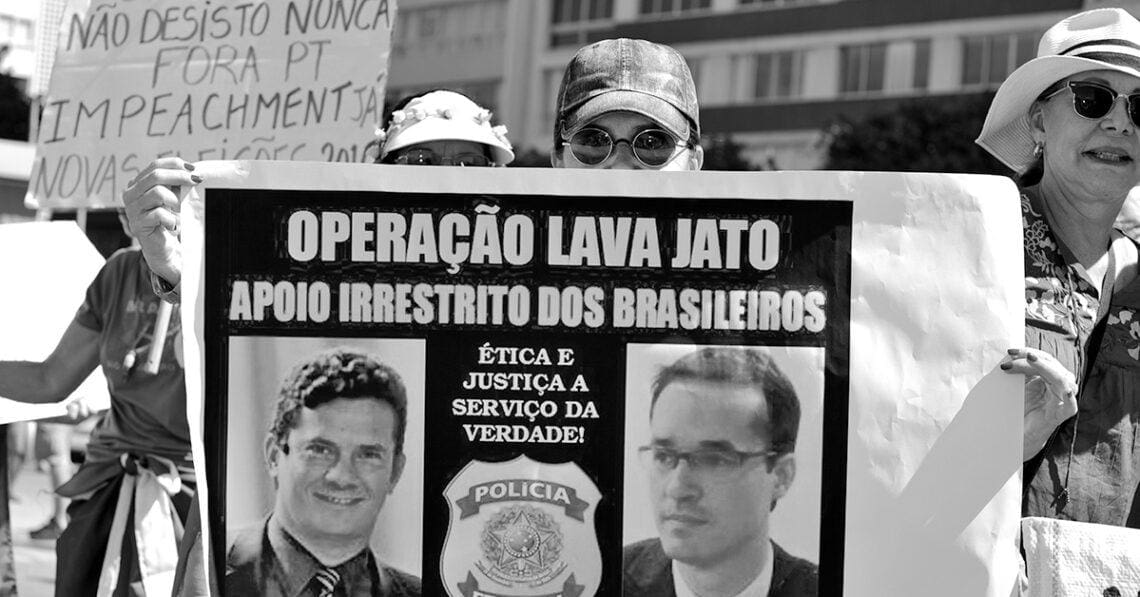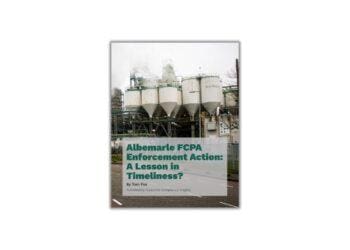Several Latin American countries have recently been beset by corporate malfeasance and corruption, leading the Biden Administration to enhance enforcement efforts in the region. Luke Cass of Womble Bond Dickinson in Washington, D.C., shares his insights on this complex, evolving situation.
Latin America has been the recent focus of considerable attention by the Biden Administration and the DOJ. In recent remarks before the U.S. House of Representatives, Army Gen. Laura J. Richardson, commander of U.S. Southern Command, described Latin America as “our shared neighborhood” and stated that no region affects American security more.
Despite strong ties based on trade, shared values and democratic traditions, Latin America is being tested with new and precarious challenges. From political leadership changes in key nations, to aggressive DOJ anti-corruption enforcement and sanctions, to disinformation campaigns by state actors, LATAM compliance areas are being tied into the proverbial Gordian knot.
This article will examine these issues and offer observations on how to navigate a path forward for companies in, or doing business with, Latin America.
Win-Lose Situation: No Matter Outcome of Brazilian Presidential Election, Corruption Wins (and Everyone Else Loses)
Brazil’s presidential contest will head to a two-man runoff election later this month, but if any observers had hopes for an anti-corruption movement to take hold in the country, Victoria Abut says the only thing that can’t win this election is transparency.
Read moreThe focus on Latin America
In June 2021, President Joe Biden stated unequivocally that the threat corruption poses to the United States and the rest of the world was a “cancer within the bodies of societies” that represents a threat to national security. As part of his remarks, the White House released a 38-page strategy on countering corruption.
The administration broadly grouped its efforts into five pillars:
- Modernizing, coordinating and resourcing U.S. government efforts to fight corruption
- Curbing illicit finance
- Holding corrupt actors accountable
- Preserving and strengthening the multilateral anti-corruption architecture
- Improving diplomatic engagement and leveraging foreign assistance resources to achieve anti-corruption policy goals
Crises and political instability are consistently the two main drivers of corruption. While not exclusive to Latin America, a recent crisis has provided the perfect example of the issue: Covid-related relief funds. With large amounts of capital being devoted to pandemic response and relief, instances of fraud, embezzlement, money laundering and other forms of corruption have spiked, showing that corruption remains a very real threat and possibility when instability is introduced into a society.
Political instability in Latin America provides opportunities for discussions around compliance and enforcement of statutes like the FCPA. For example, Brazil has long been the vanguard of anti-corruption efforts in the region. But recent political changes may hinder enforcement efforts.
As domestic tensions rise with Russia and China, the Biden Administration also has taken note that many Latin American countries have new, left-leaning leaders, many of whom are considering deepening ties with China, seeking alliances with Beijing rather than Washington. China is investing huge sums into the region, as it is in many developing areas around the world, but operates by rules and regulations rather than the compliance environment and restrictions imposed by Washington. The possibility for corruption in such a scenario is prevalent, with large infrastructure investments in Ecuador giving rise to bribery investigations as just one example. With the growing tensions between the U.S. and China, Chinese investments in Latin America are exacerbating an already complex anti-corruption and geopolitical situation.
Coincidentally, or perhaps because of the instability of the region and growing competition for hegemonic influence, Biden has sent dignitaries, including Secretary of State Antony Blinken to Latin America, to improve relationships with countries like Colombia, Chile and Peru. Biden also has started an anti-corruption task force focusing its efforts on the Northern Triangle (Guatemala, El Salvador and Honduras), representing an effort to create a regional task force in that area to combat corruption associated with both drug trafficking and human trafficking, both of which have effects that reach the U.S.
This has led to more anti-corruption enforcement in the region, whether through intentional focus, simply the result of where evidence has led prosecutors or some combination of the two. The Biden Administration’s rhetoric supports the conclusion that LATAM anti-corruption enforcement is a targeted effort rather than a natural outgrowth of investigations. Biden’s June 2021 national security memorandum discussing anti-corruption efforts has proven to be the kickoff of a much larger enforcement effort in the region.
Deputy Attorney General Lisa Monaco recently spoke at the American Bar Association’s National Institute on White Collar Crime, where she addressed the focus of the DOJ on corporate criminal enforcement. Monaco has directed a number of policy changes beginning in 2021, with the most recent changes focusing on promoting cultures of corporate compliance and liability for the individual wrongdoers rather than shareholders of the offending companies. Two new areas of particular focus for the DOJ are: (1) promoting compliance culture, including voluntary self-disclosure, and (2) adjusting corporate compensation structures to encourage “responsible corporate behavior.”
Anti-corruption enforcement in Latin America
The scale and reach of the corruption problem in Latin America is illustrated by the Petrobras case, the largest corruption probe in Brazil’s history, which to date has implicated dozens of companies and countries in a still-growing network of cases spanning Latin America and reaching into other parts of the world.
Petroleo Brasileiro is a Brazilian state-owned and -controlled energy company that agreed in 2018 to pay more than $850 million in penalties to resolve the U.S. government’s investigation into violations of the FCPA concerning their role in facilitating payments to politicians and political parties in Brazil. By 2021, Petrobras, and the domestic Brazilian investigations known as Lava Jato (“Car Wash”) resulted in nearly 280 convictions, with around 40 countries seeking legal cooperation from the Brazilian authorities to investigate.
In the Glencore matter, two subsidiaries of a Swiss-based company, a multinational commodity trading and mining firm, each pleaded guilty and agreed to pay over $1.1 billion to resolve the U.S. government’s investigation into violations of the FCPA and a commodity price manipulation scheme. The guilty pleas addressed investigations by the U.S., UK and Brazil. Glencore is significant in that it highlights one of the pillars of the DOJ policy focus trumpeted by Monaco, the need for a strong corporate compliance culture. With Glencore, high-level officials were not simply turning a blind eye to bad actors but were themselves directing bribes, relying on a pattern of using fake vendors or real vendors with fake invoices.
In the case of Stericycle, a U.S.-based international waste management company with numerous international contracts agreed to pay more than $84 million to resolve investigations by the U.S. and Brazil regarding bribes to officials in Brazil, Mexico and Argentina. Stericycle will make payments as part of a deferred prosecution agreement (DPA), which includes cooperation with the DOJ in ongoing investigations and commitments by the company to enhance its own compliance program, with an independent compliance monitor being retained for two years, followed by self-reporting for the remainder of the term. As reported by the DOJ, factors in reaching this outcome included the company’s failure to voluntarily and timely disclose the conduct that triggered the investigation and the nature, seriousness and pervasiveness of the corruption. Like with Glencore, the Stericycle case revolved around a corporate culture problem.
However, it is important to note, and instructive, that Stericycle received credit from the DOJ for its cooperation with the department’s investigation and for engaging in extensive remedial measures. The culture of Stericycle may have been problematic, but the company’s cooperation mitigated the damages, highlighting the virtue of self-reporting problems.
Another case, Tenaris, saw a Luxembourg-based global manufacturer and supplier of steel pipe products ordered to pay more than $78 million by the SEC for violations of the FCPA in connection with a bribery scheme involving its Brazilian subsidiary. The SEC noted in its order that Tenaris failed to have sufficient internal controls and created an environment in which bribes were facilitated through a number of companies. Improving the effectiveness of internal controls is the type of cultural change desired by the Biden Administration and the DOJ in the drive to promote corporate cultures of compliance. With improved internal controls, companies would be able to detect issues earlier and be provided an opportunity for voluntary self-disclosure.
It is readily apparent that anti-corruption enforcement by the DOJ in Latin America is active, aggressive and assisted by the long arm of FCPA’s extra-territoriality jurisdiction, which has recently been buttressed by the courts.
In February 2023, the U.S. Court of Appeals for the Fifth Circuit reversed a lower court decision dismissing FCPA and money-laundering charges against two non-U.S. defendants for lack of subject-matter jurisdiction. While there have been questions about FCPA prosecutions against non-U.S. defendants for actions outside the country, the Fifth Circuit decided that the question of whether a statute reaches extraterritorial acts should be litigated at trial rather than dismissed for subject matter jurisdiction early in the case.
Last year, the U.S. Court of Appeals for the Second Circuit weighed in on this issue in United States v. Hoskin, noting that there is no secondary liability for non-U.S. persons. Courts continue to grapple with questions of extraterritorial FCPA jurisdiction, but simply being a foreign national or doing business abroad should provide little comfort to bad actors.
While the FCPA represents a significant tool in the government’s toolkit, “[s]anctions are the new FCPA,” Monaco has said. The upshot of such a phrase is that the DOJ’s efforts are actively merging concerns for national security with corporate criminal enforcement. The marriage of the two through initiatives like the Northern Triangle task force are the natural outgrowth of the June 2021 Biden memo. Biden mandated numerous different agencies within the U.S. to work together to tackle the problem of corruption, based upon the administration’s determination that corruption is a threat to national security.
Cooperation fostered by the Biden Administration’s efforts can be seen all over the government, where for instance, the DOJ is working with the Treasury Department on anti-corruption matters, significant in that Treasury has the power to issue sanctions. In fact, the Treasury already has issued such sanctions in Paraguay against the former president and current vice president.
The sanction powers of the United States have been successfully deployed against countries like Russia. The expansion of sanctions tools in the realm of corporate criminal enforcement, targeting bad corporate actors around the world, is putting an increased burden on companies to be compliant. The U.S. will not wait for companies to get where they need to be in terms of compliance. Rather, companies must proactively develop a culture of compliance, regularly check with their vendors, suppliers and clients to ensure those entities are doing the same and seek to foster compliance throughout their vertical or horizontal networks of partners and agents.
Compliance
With the current climate of investigation and enforcement in mind, what can companies do to best position themselves to promote cultures of compliance in their workplaces and transactions? Moving forward, certain key components should be included in programs designed to address anti-corruption and compliance, namely:
- Culture: Companies must foster and develop policies and programs designed to demonstrate accountability within the company. These policies and procedures must demonstrate robust controls and promote regular conversations that encourage honesty and transparency at executive leadership meetings regarding compliance, as well as a clear set of values.
- Embedded controls: Companies need to facilitate trainings, risk assessments and honest examinations of processes within the company and map controls attached to each of those areas to understand whether they work by actually testing them.
- Resources: Companies will want to show they are dedicating capital to ensuring compliance, voluntary and timely reporting of any issues discovered and to promoting cultural shifts to fight corruption.
Companies also will be required to have “skin in the game” now. The DOJ has announced measures to have chief compliance officers certify the effectiveness of a company’s compliance program as part of resolutions. While this is ostensibly designed to empower chief compliance officers, it also exposes them to significant personal risk. The DOJ’s incentivizing executive-level employees to take ownership compliance processes and programs could not be more clearly demonstrated than requiring a C-level employee’s certification of compliance.
The importance of heeding DOJ guidance and promoting a corporate culture that requires, values, incentivizes and rewards compliance is clear. This is especially true if your company does business in Latin America, given the administration’s clear focus on the region. Counsel should examine their company’s systems for compliance with a particular eye toward understanding whether their company’s policies and procedures allow them to detect any misconduct in order to timely and fully disclose the situation to the DOJ to mitigate any potential issues. Counsel should work to encourage cooperation across departments like legal, compliance, finance and procurement to ensure teams are synchronized and understand the risks and consequences of failing to prevent corruption. Another key focus should be the discussion of integrated compensation structures for executives which include individual liability of the executives in the event of breaches of compliance policies and findings of corruption.
Also important to note is the DOJ’s new voluntary self-disclosure (VSD) policy, intended to provide companies with clear rewards for coming forward. All 93 U.S. Attorneys Offices now have clear and consistent guidance on how to address corporate misconduct across the country. As noted by Assistant Attorney General Kenneth A. Polite Jr., “[w]hen a company has uncovered criminal misconduct in its operations, the clearest path to avoiding a guilty plea or an indictment is voluntary self-disclosure.” Absent aggravating factors, the DOJ will not seek a guilty plea when companies voluntarily self-disclose, fully cooperate, and timely remediate criminal conduct.
Ultimately, given the broad-based policy and departmental approach to the issue and the geographic focus on Latin America, we will continue to see a mix of anti-corruption enforcement and sanctions in the near term. Guided by the example of Paraguay, sanctions appear to be a priority in anti-corruption efforts currently, and cases involving corruption in Latin America will be vigorously investigated and pursued using those tools. VSD will likely lead to an increase in the number and types of corporate criminal resolutions as companies may find the rewards too great to ignore and pursue the benefits that the VSD policy has to offer.
There are no guarantees when it comes to corporate compliance and anti-corruption. But at the end of the day, companies should want a stable, peaceful and democratic Latin America. One part that companies may play is by proactively addressing the policy initiatives coming from the Biden Administration and advanced by the DOJ and the SEC) This will not only ensure a prosperous and valuable shared neighborhood but will also be vital should your company find itself the target of an investigation.




 Luke Cass is a partner at Womble Bond Dickinson in Washington, D.C. He defends corporations and individuals in connection with a variety of federal criminal allegations, including healthcare fraud, conspiracy, mail and wire fraud, embezzlement, bank fraud and money laundering. He also conducts proactive, internal investigations related to bribery, misbranding and the FCPA. He served as a federal prosecutor for over a decade, has significant experience with white-collar investigations and has litigated federal appellate and district court cases throughout the U.S.
Luke Cass is a partner at Womble Bond Dickinson in Washington, D.C. He defends corporations and individuals in connection with a variety of federal criminal allegations, including healthcare fraud, conspiracy, mail and wire fraud, embezzlement, bank fraud and money laundering. He also conducts proactive, internal investigations related to bribery, misbranding and the FCPA. He served as a federal prosecutor for over a decade, has significant experience with white-collar investigations and has litigated federal appellate and district court cases throughout the U.S.






